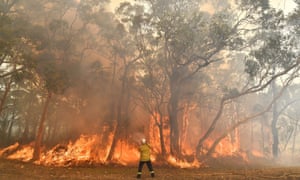Most firefighting is just bloody hard work. We need a new support system
I
am a member of the NSW Rural Fire Service because it is a volunteer
service. Volunteering makes me feel good about the work we do and the
opportunity to give back to my community. We are proud to be volunteers.
But there are limits!
Scott Morrison recently dismissed concerns about the thousands of volunteer firefighters doing long hours over many weeks saying “they want to be there”.
Yes, we do want to help our communities. Yes, it is great to be part of a “family” of dedicated men and women who are willing to sacrifice time and money to perform essential services. We are proud to be volunteers. But there are limits!
There is a public perception that firefighting is heroic, but in reality, standing in front of a wall of fire armed with a hose is something firefighters try to avoid.
Most firefighting is just bloody hard work, and often boring. Back-burning, blacking out, raking firebreaks, patrolling through the night, sitting around waiting to be tasked by an overwhelmed IMT, working 17 hour shifts without a break or food because the shit is hitting the fan, getting home at 1am only to be called out again at 4am to a non-existent fire because the community is on edge, extinguishing barbecues during total fire bans, false alarms.
This is the reality of being a firefighter. We are proud to be volunteers. But there are limits!Scott Morrison recently dismissed concerns about the thousands of volunteer firefighters doing long hours over many weeks saying “they want to be there”.
Yes, we do want to help our communities. Yes, it is great to be part of a “family” of dedicated men and women who are willing to sacrifice time and money to perform essential services. We are proud to be volunteers. But there are limits!
There is a public perception that firefighting is heroic, but in reality, standing in front of a wall of fire armed with a hose is something firefighters try to avoid.
Most firefighting is just bloody hard work, and often boring. Back-burning, blacking out, raking firebreaks, patrolling through the night, sitting around waiting to be tasked by an overwhelmed IMT, working 17 hour shifts without a break or food because the shit is hitting the fan, getting home at 1am only to be called out again at 4am to a non-existent fire because the community is on edge, extinguishing barbecues during total fire bans, false alarms.
And then there are the unsung heroes, our families. The ones who worry if we will come home. The ones we leave to fend for themselves during severe fire weather. The ones we hardly see for days. The plans cancelled at the last minute. The jobs left undone. The cuppa and hug when we get home. The dirty PPE that is washed while we sleep. The stress that all this can put on even the strongest relationship.
They didn’t volunteer for this, but they accept it, year after loyal year. They are proud we are volunteers. But there are limits!
One, two, three...six. The weeks are dragging on and still the fires are uncontrolled. It is getting harder and harder to raise crews.
People can’t afford the lost time and wages. Even those who are lucky enough to work for employers who continue to pay us during emergencies worry about the impact on our jobs. The stress and tensions increase over time. So the burden of manning the trucks falls increasingly on retired members.
If this is the “new normal” then we need a new model. We are proud to be volunteers. But there are limits!
We need a new support system that kicks in after certain period of time.
Support that allows us to continue to contribute over increasingly long fire seasons.
This could include funding so our employers can replace us with casual staff while we continue to be paid. This could include direct payment for the self-employed or unemployed. This could include refunds for daycare and after-school care. This could include laundry and meal allowances for those who live alone and are too exhausted to wash and cook when they arrive home.
These are just some ideas, starting points for discussion. Any new system must be carefully designed in consultation with the volunteers, and it must be flexible because we each have different circumstances.
But we need something, and soon. We are proud to be volunteers. We want to remain volunteers. But there are limits! Even “heroes” need a safety net.
- Dr Geoff Goldrick is a deputy captain with the NSW Rural Fire Service in Northern NSW

No comments:
Post a Comment